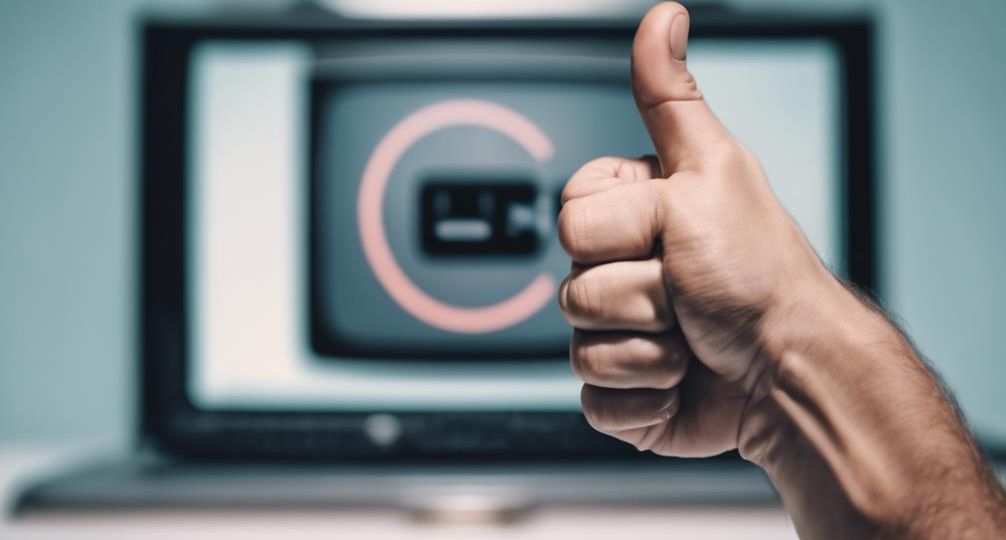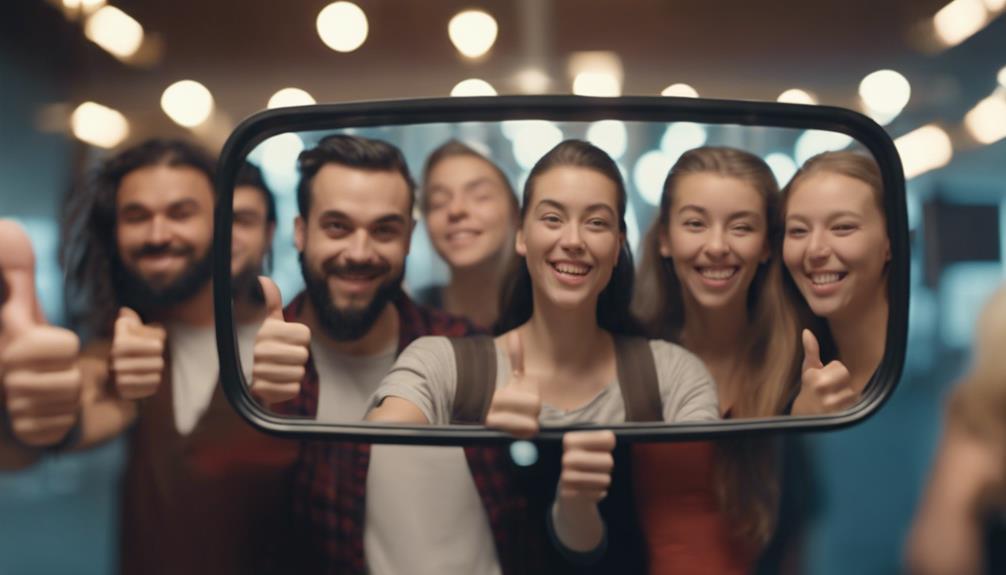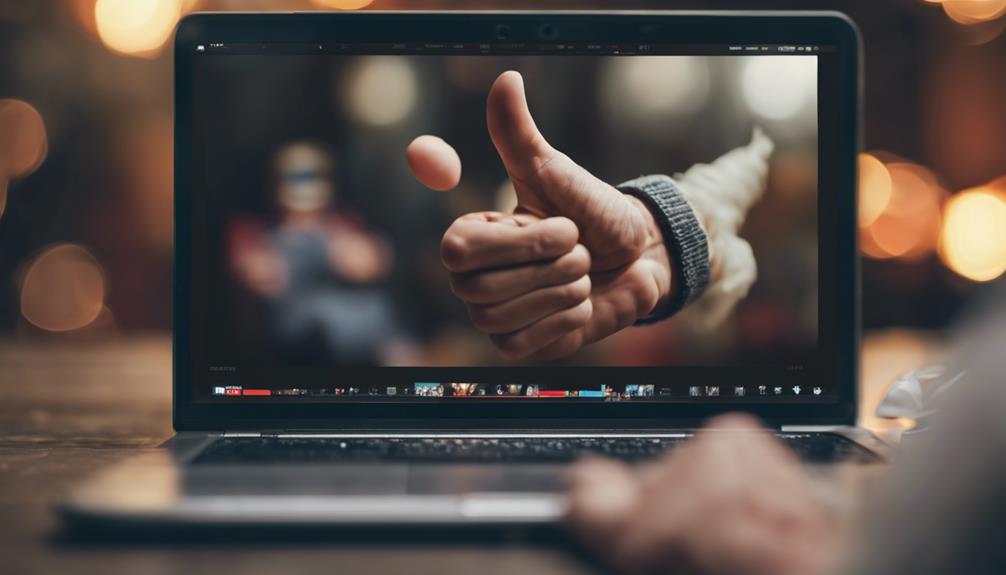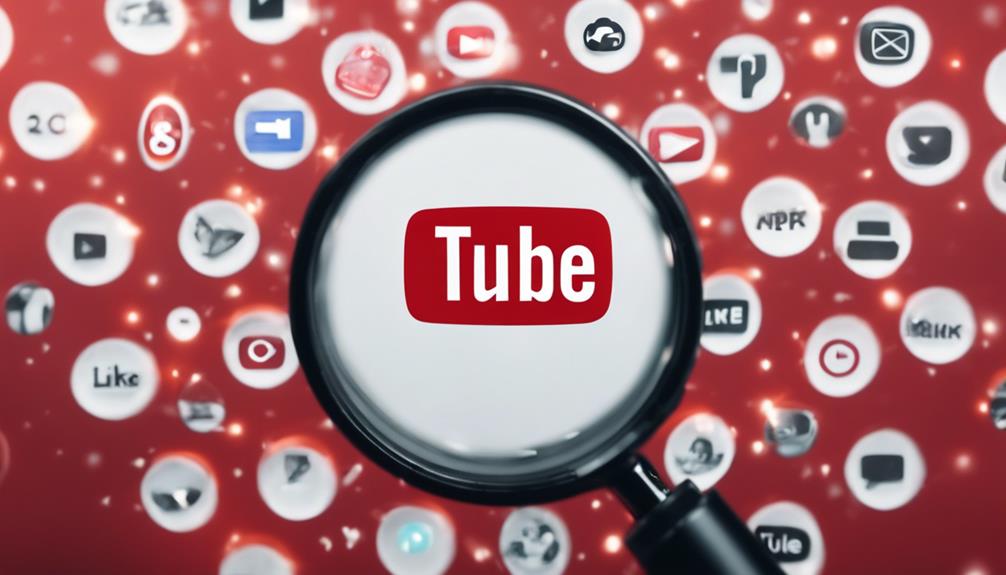
Should I like my own YouTube videos?
Just as a farmer sows seeds with the hope of a bountiful harvest, you, as a YouTube content creator, aspire for likes, comments, and shares on your videos.
You’ve wondered if liking your own videos could be a secret fertilizer to boost their growth. It’s a question that raises intriguing possibilities, casting a shadow of curiosity over the landscape of your YouTube journey.
But before you plunge into self-liking, have you considered its potential repercussions and how it might shape viewer perception? Let’s explore this together and uncover the truth beneath the surface.
Key Takeaways
- Self-liking your YouTube videos can improve engagement metrics and visibility but may be viewed as manipulative by the algorithm.
- Overuse of self-liking can harm your channel’s authenticity, credibility, and viewer trust, potentially leading to negative audience perception.
- A single like, including self-likes, has a minimal impact on YouTube video rankings; creating high-quality and engaging content is more crucial.
- Balancing ethical engagement tactics, such as liking your videos, with innovative strategies aligned with your brand can lead to YouTube success.
Understanding YouTube’s Algorithm

To effectively leverage your YouTube presence, you need to get a grip on how its algorithm works. It’s not just technology; it’s the lifeline of your channel’s visibility. Your algorithm understanding will serve you as a tool to shape your content strategy, allowing you to optimize videos for maximum reach.
The algorithm is YouTube’s method of deciding which videos to display and promote. Think of it as a matchmaker, pairing your videos with an audience hungry for content like yours. It’s based on relevance and popularity, with a dash of secret sauce that YouTube keeps under wraps.
For video optimization, focus on creating content that resonates with your viewers. The algorithm loves engagement, so encourage comments, shares, and likes. Your video’s title, description, and tags also play a crucial role, as they help YouTube understand what your video is about.
The Art of Self-Liking Videos
Diving into the art of self-liking videos, you might find it a strategic move that can potentially boost your engagement metrics and visibility on YouTube. However, like any strategy, it’s not without its implications. Self-endorsement ethics come into play here. You’re essentially endorsing your content, creating a cycle of self-promotion. While it’s not unethical, it raises questions about authenticity.
In the realm of vanity metrics analysis, self-liking may inflate your engagement numbers. It’s a double-edged sword. On one hand, it can give the illusion of popularity, attracting more viewers. On the other, it could lead to skewed analytics, making it harder to gauge genuine audience reactions.
The art of self-liking videos is a nuanced practice. It’s not just about clicking that thumbs up icon. It’s a calculated move, an analytical process that requires strategic thought. It’s about using every tool at your disposal, albeit ethically, to enhance your channel’s visibility. For an innovative content creator like you, understanding this practice can be a game-changer. But remember, authenticity is key. Success lies not just in numbers, but in genuine engagement and quality content.
Potential Benefits of Liking Your Videos

Harnessing the power of self-liking, you can unlock several potential benefits for your YouTube channel that might just tip the scales in your favor. It’s not simply a matter of vanity, but rather an insightful strategy that fully understands the landscape of social media ethics and the impacts of self-esteem.
Here are five benefits that you can reap:
- Boost in Visibility: YouTube’s algorithm favors interaction. When you like your video, it’s a form of engagement that can heighten your video’s visibility.
- Social Proof: A video with more likes appears more popular and can attract more viewers.
- Self Esteem Impacts: Liking your content can boost your confidence, fostering a positive cycle of content creation.
- Initiating Interaction: Your like can prompt others to like, comment, or share your video.
- Algorithm Advantage: YouTube rewards activity, not just views. Your like contributes to your overall activity score.
Understanding these benefits, you’re not just navigating the social media landscape but shaping it, applying innovative approaches to maximize your YouTube channel’s potential. Remember, it’s not just about self-promotion, but how you engage with your audience and yourself.
Potential Drawbacks of Liking Your Videos
While liking your own videos might seem like a harmless boost, it’s not without potential pitfalls.
The YouTube algorithm could interpret this as manipulative behavior, potentially impacting your channel’s visibility. Moreover, your audience might perceive this self-liking as an excessive self-promotion, which could harm your authenticity and credibility.
YouTube Algorithm Implications
You may think it’s a smart strategy to like your own YouTube videos, but it’s important to understand the potential drawbacks this action could have on the YouTube algorithm. Essentially, you’re attempting an algorithm manipulation, which could disrupt viewer psychology. Here are some implications to mull over:
- YouTube’s algorithm might perceive self-likes as inauthentic engagement, potentially downgrading your video’s visibility.
- Self-likes may not contribute to the ‘engagement’ YouTube’s algorithm favors.
- YouTube could consider this action as ‘gaming the system’, leading to penalties.
- Your video metrics may be skewed, making it harder to analyze performance.
- Frequent self-likes could trigger YouTube’s spam filters.
Perception of Self-Promotion
Beyond the potential impact on the YouTube algorithm, there’s also the risk of creating an unfavorable perception of self-promotion when you like your own videos. Your audience, innovative thinkers that they are, can easily see through these tactics.
The self-promotion ethics involved in this practice may be called into question. If it becomes apparent you’re artificially boosting your content, trust can erode rapidly. This is where influencer transparency comes into play. It’s critical to be honest and open about your promotional strategies.
Liking your own videos may provide a temporary boost, but the potential long-term damage to your reputation could outweigh any immediate benefits. As a strategic content creator, you need to weigh these pros and cons carefully.
How Viewers Perceive Self-Liking

Understanding how viewers perceive self-liking on YouTube can shape the strategy for your channel’s engagement and growth. It’s crucial to consider the personal branding impact and ethical considerations involved in this practice.
- Viewers value authenticity. They could perceive self-liking as artificial inflation of your video’s popularity, which can harm your credibility.
- Ethical considerations come into play if you’re not transparent about self-liking. It’s seen as deceitful, thereby negatively impacting your personal brand.
- The YouTube community values genuine engagement. Excessive self-promotion, including self-liking, may lead to viewer disapproval or backlash.
- Some viewers mightn’t care if you like your own videos, especially if your content is engaging and high-quality. They’re primarily there for the content, not the likes.
- However, others may view self-liking as a sign of confidence and self-assurance, which can positively influence their perception of you and your brand.
In essence, understanding your audience’s perception can help you navigate this delicate balance between self-promotion and authenticity. Be strategic in your actions, considering the potential impact on your personal brand and viewer perceptions. Strive to maintain transparency and ethics in your approach, as these will ultimately dictate your channel’s success.
Impact on Engagement Rates
Liking your own YouTube videos can potentially drive viewer interaction, giving you an edge in the algorithmic game.
But, it’s not all rosy; you might face a real dilemma in maintaining perceived authenticity.
Let’s strategically analyze these aspects to understand the true impact on engagement rates.
Boosting Viewer Interaction
Surprisingly, even a simple action like liking your own YouTube videos can significantly increase viewer interaction and boost your engagement rates. This tactic taps into viewer retention strategies and influencer collaborations, fostering an interactive community around your content.
Consider the following points:
- Liking your own videos signals active engagement to your audience, encouraging them to do the same.
- This action can spark discussions in the comments section, increasing overall engagement.
- Collaborating with influencers and liking their content can lead to reciprocation, expanding your reach.
- Consistently engaging with your content can enhance viewer retention as it creates a lively, interactive environment.
- These interactions can influence viewers to share your content, further boosting your engagement rates.
Algorithmic Advantages
When you like your own YouTube videos, you’re not just boosting viewer interaction – you’re also playing a strategic game with YouTube’s algorithm, potentially propelling your content to wider audiences. This approach, however, treads a fine line in self-promotion ethics. It’s a calculated move, but one that carries algorithm manipulation risks.
YouTube’s algorithm rewards engagement, so liking your own content could signal to the platform that your video is worth promoting. But remember, it’s a complex system, not easily tricked; if your self-likes are disproportionate to other viewer engagement, it might backfire. Strive to balance this strategy with authentic audience interaction. In the end, your ability to innovate, engage, and adapt within YouTube’s ever-evolving algorithm landscape will determine your success.
Perceived Authenticity Dilemma
But the strategy of self-liking doesn’t come without its pitfalls, particularly when it comes to the perceived authenticity of your channel and its impact on engagement rates. Authenticity perception can take a hit when viewers notice a disproportionate number of likes originating from the content creator. This could lead them to question your self-promotion ethics and ultimately, your credibility.
- It can create an impression of desperation.
- Your content may appear less organic, more manufactured.
- It may lead to skepticism about your channel’s true popularity.
- Viewers may feel manipulated, reducing their engagement.
- Your credibility and relationship with your audience could be compromised.
To avoid these risks, consider focusing on innovative strategies to organically increase likes and engagement.
Effect on YouTube Video Rankings
In terms of YouTube video rankings, liking your own videos doesn’t significantly boost your visibility or algorithmic favor. This isn’t a strategic move that will catapult you to the top of the search results. It’s a common misconception, likely fueled by a misunderstanding of viewer psychology and algorithm manipulation.
In the grand scheme of YouTube’s complex algorithm, your single like is a minuscule drop in the ocean. The algorithm is designed to reward engagement, yes, but it’s more sophisticated than mere like counts. It considers watch time, viewer retention, and viewer interaction, including comments and shares. Liking your own video doesn’t impact these metrics substantially.
Furthermore, YouTube’s algorithm is notoriously secretive and ever-changing. It’s a machine learning system, continually evolving to better serve viewer preferences. This means any attempts at direct manipulation, like self-liking, are likely to be ineffective at best and counterproductive at worst.
In essence, if you’re looking to maximize your YouTube video rankings, it’s smarter to focus on creating high-quality, engaging content that naturally attracts likes, shares, and comments. This approach is more likely to resonate with both the algorithm and your viewer’s psychology, fostering a more authentic and successful YouTube presence.
Does Self-Liking Manipulate Metrics?

Given the complexity of YouTube’s algorithm discussed earlier, you might wonder if self-liking can actually manipulate metrics in any significant way. While it’s clear that user engagement affects video promotion, how much weight do your own interactions carry?
Analyzing from a strategic viewpoint, it’s essential to evaluate the potential implications of self-liking, especially in relation to:
- Metric Manipulation Ethics
- Algorithm Gaming Consequences
- Viewer Perception
- Content Authenticity
- Channel Credibility
Just as with any other platform, YouTube has guidelines regarding metric manipulation and algorithm gaming. Ethically, self-liking might seem like a harmless act but it could potentially skew the actual engagement data, leading to inaccurate metrics. The consequences of gaming the algorithm are more complex. If YouTube identifies this behavior, it could lead to penalties such as reduced visibility or even channel suspension.
Furthermore, your viewers might perceive self-liking as a desperate act, which could harm your content’s authenticity and overall channel credibility. Hence, rather than focusing on potentially misleading tactics, it’s more beneficial to invest in creating innovative, engaging content that naturally attracts likes and comments.
Self-Liking Vs Authentic Engagement
Drawing a line between self-liking and authentic engagement, you’ll find that the latter’s impact on your channel’s growth and credibility far outweighs any superficial boost the former might provide. Self-liking can be a short cut, but it’s an unethical one. True innovation thrives on genuine interaction, not self-promotion.
Consider the following table:
| Strategy | Pros | Cons |
|---|---|---|
| Self-Liking | Immediate likes, Easy to implement | Unethical, Potential Community backlash |
| Authentic Engagement | Builds credibility, Encourages organic growth | Takes time, Requires effort |
The ‘self dislike consequences’ can far outweigh any immediate gains self-liking may bring. Your audience values authenticity. They can sense when engagement isn’t genuine, and this can harm your channel’s reputation.
Unethical self-liking, while tempting, may result in negative consequences. It’s a strategy that lacks long-term vision and risks damaging your credibility. Authentic engagement, on the other hand, while requiring more effort, fosters a loyal audience and organic growth.
The Role of Other Engagement Factors

While liking your own videos might be a tempting tactic, it’s crucial to consider other engagement factors that carry significant weight. Comments, for instance, not only show interaction but also provide valuable feedback.
Furthermore, the shareability of your content and its reach, coupled with the impact of view duration can strategically boost your overall engagement and channel growth.
Importance of Comments
Beyond just liking your own YouTube videos, it’s crucial to recognize that comments play a significant role in driving viewer engagement and boosting your channel’s visibility. How you manage these comments, using solid comment moderation strategies, can make or break your success.
User-generated content in the form of comments can:
- Foster a community around your channel.
- Encourage active participation and discussions.
- Influence the YouTube algorithm in a positive way.
- Lead to higher visibility and channel growth.
- Offer valuable insights into your audience’s preferences.
Strategically, it’s wise to encourage comments, respond thoughtfully, and manage any negative interactions. This is a key part of your channel’s growth and sustainability. Master this, and you’re well on your way to YouTube success.
Just as you’ve mastered the art of managing comments for better engagement, it’s equally important to understand the role of shareability and reach in your YouTube success.
The viral potential of your content is closely tied to its shareability. The more your viewers feel compelled to share your content, the greater your reach and the higher your chances for a video to go viral. Influencer collaborations can significantly boost this process, as they can introduce your content to a wider audience.
It’s a strategic move to foster relationships with influencers relevant to your content. Remember, every share is a potential new viewer, and every new viewer is a potential subscriber.
Capitalize on shareability and influencer collaborations to enhance your YouTube success.
View Duration Impact
In your journey to maximize YouTube engagement, the impact of view duration also plays a vital role, often overlooked amidst the focus on likes, shares, and comments. It’s not enough to just attract viewership; you need to retain that audience.
To boost your view duration, consider the following viewer retention strategies:
- Create compelling, high-quality content that grips your audience from start to finish.
- Utilize audience demographic analysis to tailor your content to your viewers’ interests.
- Incorporate interactive elements like quizzes or Q&As.
- Schedule your videos strategically, considering viewer availability.
- Optimize video SEO to reach the right audience.
Insights From Youtube Creators

While you might harbor doubts about liking your own YouTube videos, many seasoned creators have shed light on its potential impact and strategic value. It’s not about vanity or self-promotion, but about capitalizing on YouTube’s algorithm. Creators are using this approach to combat the well-known issue of ‘Creator Burnout’ and push their content into the recommended videos section.
The act of liking your own video, they argue, is a strategic move towards video monetization. By liking your own content, you’re effectively signaling to YouTube’s algorithm that your content is engaging. This could potentially boost your video’s visibility, thus increasing opportunities for ad revenue.
However, liking your own videos isn’t a magic bullet. It’s part of a larger strategy that includes creating high-quality content, engaging with your audience, and staying on top of YouTube’s ever-evolving algorithm.
As you navigate your YouTube journey, remember that innovation is key. Embrace new strategies, but also ensure they align with your brand and content. Ultimately, the decision to like your own videos should be a strategic one, not a desperate bid for attention. Each move should bring you one step closer to your goal of creating impactful, monetizable content.
Best Practices for Engagement Boosting
Boosting engagement on your YouTube videos involves a savvy mix of strategic planning, audience understanding, and effective content creation. In this digital age, it’s crucial to balance self-promotion ethics with innovative video visibility tactics. This involves striking the right balance between promoting your content and ensuring it’s genuinely engaging and valuable to your audience.
To maximize your YouTube engagement, consider these best practices:
- Innovate with your content: Always seek to create fresh and intriguing content that resonates with your audience.
- Understand your audience: Use analytics to understand your audience’s preferences, and tailor your content accordingly.
- Use video visibility tactics: Optimize your video titles, descriptions, and tags to increase its visibility.
- Engage with your viewers: Respond to comments promptly, encourage viewers to like, share, and subscribe to your channel.
- Promote ethically: While it’s important to promote your content, remember to do so ethically.

